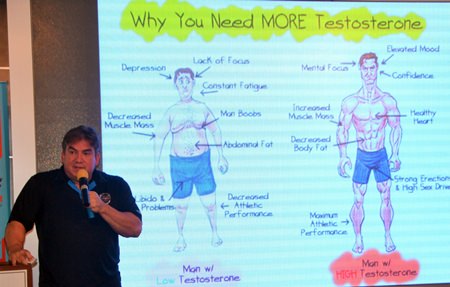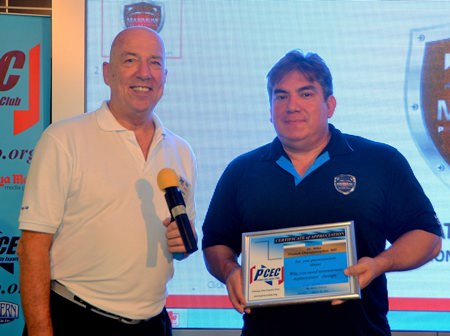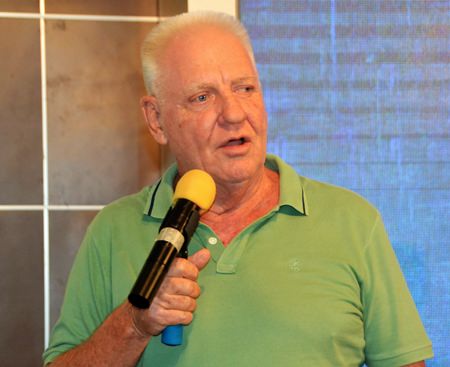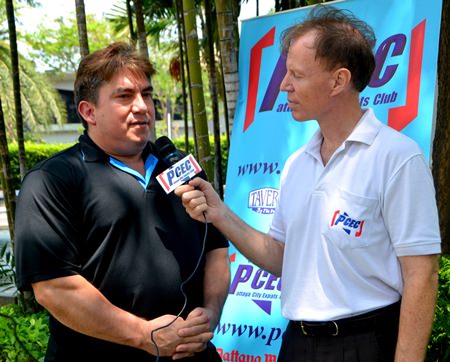“Common does not equal normal. Low T, while common, is most certainly not normal!” was the theme of the presentation at the Pattaya City Expats Club meeting on March 20. The title of Dr. Tim Lopez’s talk was State of the Art Testosterone Replacement Therapy which might have made some people a bit uncomfortable, but as presented, soon evolved into a very enlightening and interesting topic.
Tim Lopez, PhD, is a Postdoctoral Scholar, graduate of the University of California, San Francisco, California and a principal at the Maximum Performance Wellness Center, Pattaya, Thailand. The Center provides Urological Services by a Board Certified Urologist, Pramuk Charupoonphol, MD and also provides Women’s Hormone Replacement Therapy. “Doctor Tim”, as he is affectionately known, focused today’s presentation on male testosterone replacement (TR) therapy.
 The PCEC was honored by a visit from Pattaya Police Superintendent Col. Sukthat Pumphamuang (4th right). Welcoming him was PCEC Chairman Roy Albiston (3rd from right) along with several members of the Board of Governors and member Kuhn Sermsakdi Sabhananda (right).
The PCEC was honored by a visit from Pattaya Police Superintendent Col. Sukthat Pumphamuang (4th right). Welcoming him was PCEC Chairman Roy Albiston (3rd from right) along with several members of the Board of Governors and member Kuhn Sermsakdi Sabhananda (right).
Doctor Tim explained how testosterone is secreted/regulated in the body starting with the hypothalamus, a pea-size portion of the brain that provides a variety of functions. It has a vital role in controlling many bodily functions including the release of hormones from the pituitary gland. The pituitary gland, another pea-sized gland, lies just below the hypothalamus and it plays a major role in regulating general wellbeing, by controlling the activity of most of the hormone-secreting glands, including the testes or male gonads. The gonads have two functions – to produce sperm and to produce hormones, particularly testosterone.
 Dr. Tim Lopez, PhD, describes the effects of low and high testosterone. He explained that they use the answers to an extensive questionnaire and results of several diagnostic tests to determine whether a testosterone deficiency exists and whether replacement therapy is appropriate for the patient.
Dr. Tim Lopez, PhD, describes the effects of low and high testosterone. He explained that they use the answers to an extensive questionnaire and results of several diagnostic tests to determine whether a testosterone deficiency exists and whether replacement therapy is appropriate for the patient.
Testosterone not only affects male sexual organs and sex drive, it also affects hair growth, muscle growth, mood/confidence/memory functions as well as red blood cell production, bone mass density and other functions.
Men are bombarded by advertising campaigns – “Don’t feel well? Ask your doctor about low testosterone”. They come in saying they have lost their sex drive, feel excessively fatigued, weaker, depressed, which are all common symptoms of a drop in testosterone. After age 30, most men begin to experience a gradual decline in testosterone. A decrease in sex drive sometimes accompanies the drop in testosterone, leading many men to mistakenly believe that their loss of interest in sex is simply due to getting older. Other factors included obesity, diabetes, high blood pressure, sleep apnea and certain drugs, including statins, opioids, beta blockers, antipsychotics, antidepressants and others.
 MC Roy Albiston presents Dr. Tim Lopez, PhD, with the PCEC’s Certificate of Appreciation for his informative and interesting presentation on testosterone replacement therapy.
MC Roy Albiston presents Dr. Tim Lopez, PhD, with the PCEC’s Certificate of Appreciation for his informative and interesting presentation on testosterone replacement therapy.
Doctor Tim emphasized that low testosterone is diagnosed with “both” laboratory findings and clinical symptoms. He talked about normal levels of testosterone range from about 300 to 1,200 ng/dL with optimal levels of about 750 to 1075 ng/dL, depending on overall health. He stated it is not just the levels that are important but that it is important to determine if a low testosterone level is simply due to normal aging or if it is due to a disease. The center’s protocol calls for a variety of blood tests, as well as clinical evaluations. There is no age limit, but every patient is different and treatment or non-treatment, is patient specific.
 Member Henk Hauer announces that he has volunteered to take over from Hans (Jon) Stroosnyder, in providing assistance to those Expats interested in getting a Thai driving license. Henk says that he will continue the assistance trips the same as Jon has done for many years. The only change will be that the trips will be on the last Wednesday of the month instead of the first.
Member Henk Hauer announces that he has volunteered to take over from Hans (Jon) Stroosnyder, in providing assistance to those Expats interested in getting a Thai driving license. Henk says that he will continue the assistance trips the same as Jon has done for many years. The only change will be that the trips will be on the last Wednesday of the month instead of the first.
The doctor also talked about potential risks of TRT. As with any medical intervention, the benefits of TRT must be weighed against the potential risk of adverse reactions or side effects of testosterone replacement therapy, such as increased Red Blood Cells (Polycythemia), increased estradiol and acne. However, studies found that there is no increased risk of the development of prostate cancer, although some patients must be monitored.
He talked about the benefits of testosterone therapy (TR) that reach beyond boosting energy and sex drive but that it could potentially help to reduce fat and increase muscle, improve concentration, maintain sleep, maintain bone density/strength, improve mood, insulin sensitivity, erectile function, motivation and increase sense of wellbeing.
 PCEC member Ren Lexander interviews Dr. Tim Lopez, PhD, after his presentation testosterone replacement therapy. To view the interview, visit: https://www.youtube.com/watch?v=fSVbWYWxcRw.
PCEC member Ren Lexander interviews Dr. Tim Lopez, PhD, after his presentation testosterone replacement therapy. To view the interview, visit: https://www.youtube.com/watch?v=fSVbWYWxcRw.
MC Roy Albiston brought everyone up to date on Club and other events and called on Ira Wettenstein to conduct the Open Forum, where questions are asked and answered about Expat living in Thailand, especially Pattaya. For more information on the PCEC’s many activities, visit their website at www.pcecclub.org.




